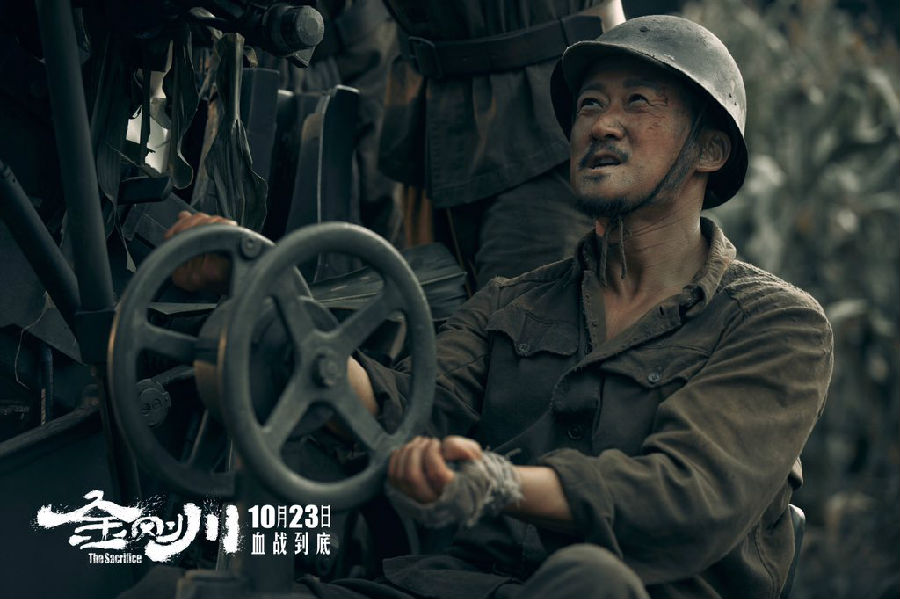To mark the 70th anniversary of the Chinese People's Volunteers forces entering the Democratic People's Republic of Korea to fight in the War to Resist US Aggression and Aid Korea (1950-53), the epic film The Sacrifice opened on Oct 23, quickly topping the country's box office charts during the first weekend.
为纪念抗美援朝出国作战70周年,电影《金刚川》于10月23日上映,迅速成为本周末的全国票房冠军。
Bringing together three A-list directors — Guan Hu, Guo Fan and Lu Yang — the film is adapted from true stories but added fictional content. The cinematic story is set on July 12, 1953, the second day after the outbreak of the Battle of Kumsong.
集结了三名顶尖导演管虎、郭帆和路阳,这部“命题式作文”的电影改编自真实历史事件,但进行了艺术加工。影片中的故事发生于1953年7月12日,是金城战役打响的第二天。
According to the Ministry of National Defense, the Battle of Kumsong — which lasted 15 days — was the last fight of the war. Chinese People's Volunteers army killed, wounded and captured more than 52,000 enemy troops, accelerating the signing of the armistice.
据国防部官网上介绍,金城战役是抗美援朝战争的最后一次战役,此役历时15天,志愿军毙伤俘敌5.2万余人,有力地促进了朝鲜停战的实现。
I watched the film during the Beijing premiere on Thursday night, hardly able to hold back my tears for the fearless Chinese soldiers, who bravely fought until the last moment, despite the fact their weapons were much lower quality than those of the US forces.
上周四晚,《金刚川》在北京举办首映礼时,我看了这部影片,忍不住泪盈于睫。尽管中国志愿军的武器装备远远落后于美军,他们以异常惨烈的决绝,战斗到生命最后一刻。
Unlike most previous domestic war-themed films that chronicle milestone incidents or highlight historic figures, the feature is quite unlikely to turn the lens to ordinary soldiers who sacrificed their lives to defend a bridge.
中国不乏战争片。《金刚川》却另辟蹊径,没有像以往军事题材影片一样,着眼于重大历史事件或是历史中的风云人物,却将镜头对准了普通士兵,记录下他们以血肉之躯守住那座桥。

Stretching across the torrent Kumgang River with its widest part reaching around 60 meters and as deep as four meters, the bridge was the only portal to transport thousands of Chinese soldiers and military vehicles to the battlefield of Kumsong.
奔腾的金刚川深4米,其最宽处达60米,跨越于湍急河面上的一座简易工兵桥,是将志愿军大部队运往金城战役前线的唯一通道。
In the film that unfolds with three different perspectives, you will see the air was dominated by American fighters due to Chinese troops' severe shortage of weapons, resulting in many deaths among Chinese soldiers.
影片从三个视角分别切入。由于中国志愿军武器装备严重不足,金刚川上的制空权完全被美军霸占,这场守桥保卫战打得异常惨烈。
Zhang Yi has garnered the most praise thanks to his textbook portrayal of Zhang Fei, an anti-aircraft gunner, convincingly showcasing his transformation from being a somewhat cowardly, hesitant figure to a fearless hero who wants revenge for his close comrade and creates a chance for the major forces to get across the bridge.
张译又一次奉献了教课书般的演技。他饰演高射炮炮手张飞,传神地表演出这个角色从起初的懦弱犹豫到最后的决绝无畏,为战友报仇、为大部队能渡河而拼死一搏。
In the last scene, the character climbs back to an anti-craft gun despite one of his arms and legs being blown up during a bombing attack, using his last strength to fire at a diving US fighter plane.
在最后的场景中,张飞因美军的轰炸失去一条腿和一条胳膊,他拖着残缺的身体爬回高射炮上,拼尽最后一丝力气,将炮弹对准俯冲的美军飞机。
Just at that moment, you may find your body clenched up and your stomach in knots, realizing the line in China's national anthem that says "using our flesh and blood to build the Great Wall" has literal implications.
看到这惨烈的一刻时,你或许会忍不住觉得自己的身体僵硬了,胃里翻江倒海。看到战士们以血肉之躯架桥,你才能真正体会到国歌里唱的那句:“把我们的血肉,筑成我们新的长城。”













